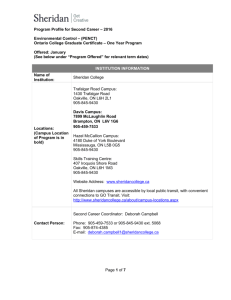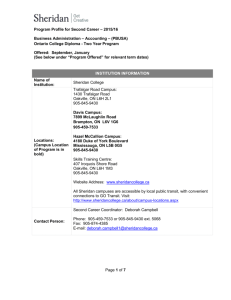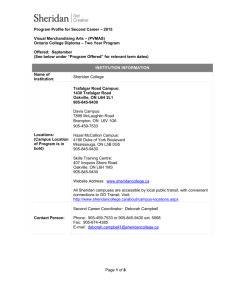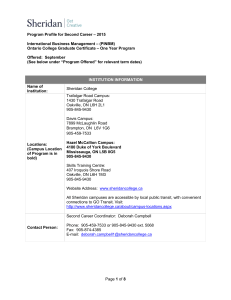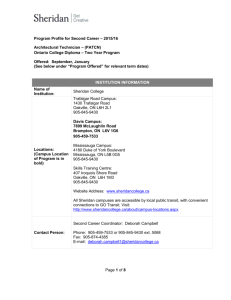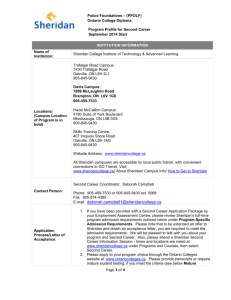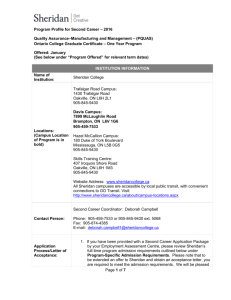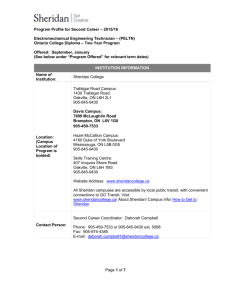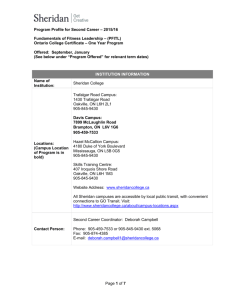INSTITUTION INFORMATION
advertisement
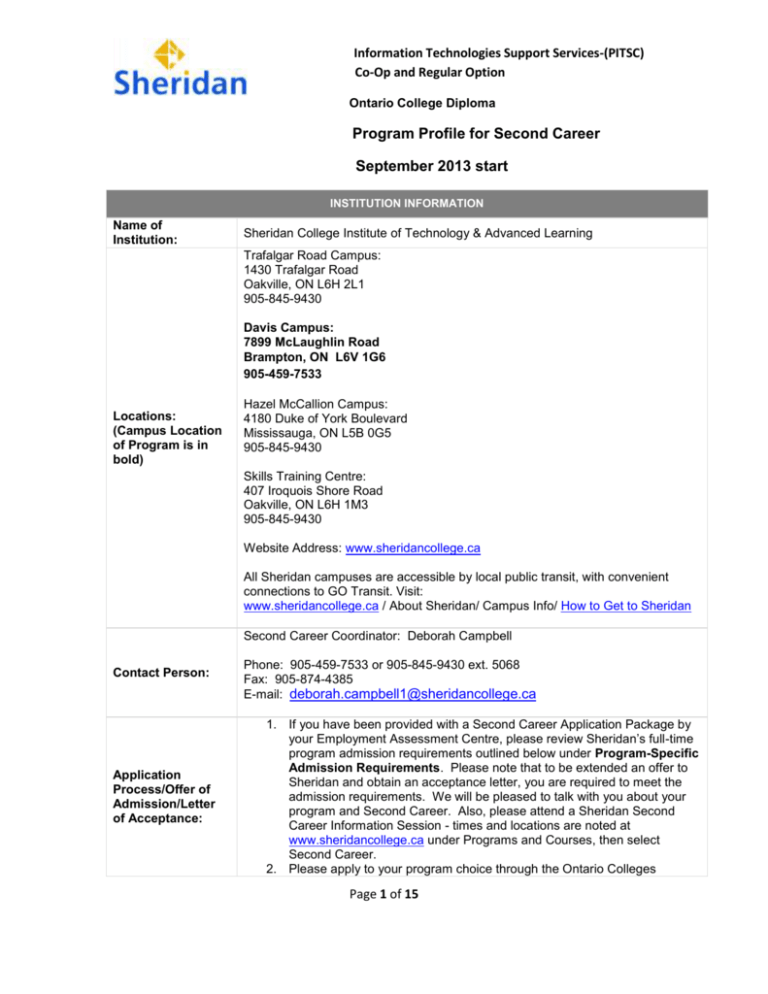
Information Technologies Support Services-(PITSC) Co-Op and Regular Option Ontario College Diploma Program Profile for Second Career September 2013 start INSTITUTION INFORMATION Name of Institution: Sheridan College Institute of Technology & Advanced Learning Trafalgar Road Campus: 1430 Trafalgar Road Oakville, ON L6H 2L1 905-845-9430 Davis Campus: 7899 McLaughlin Road Brampton, ON L6V 1G6 905-459-7533 Locations: (Campus Location of Program is in bold) Hazel McCallion Campus: 4180 Duke of York Boulevard Mississauga, ON L5B 0G5 905-845-9430 Skills Training Centre: 407 Iroquois Shore Road Oakville, ON L6H 1M3 905-845-9430 Website Address: www.sheridancollege.ca All Sheridan campuses are accessible by local public transit, with convenient connections to GO Transit. Visit: www.sheridancollege.ca / About Sheridan/ Campus Info/ How to Get to Sheridan Second Career Coordinator: Deborah Campbell Contact Person: Application Process/Offer of Admission/Letter of Acceptance: Phone: 905-459-7533 or 905-845-9430 ext. 5068 Fax: 905-874-4385 E-mail: deborah.campbell1@sheridancollege.ca 1. If you have been provided with a Second Career Application Package by your Employment Assessment Centre, please review Sheridan’s full-time program admission requirements outlined below under Program-Specific Admission Requirements. Please note that to be extended an offer to Sheridan and obtain an acceptance letter, you are required to meet the admission requirements. We will be pleased to talk with you about your program and Second Career. Also, please attend a Sheridan Second Career Information Session - times and locations are noted at www.sheridancollege.ca under Programs and Courses, then select Second Career. 2. Please apply to your program choice through the Ontario Colleges Page 1 of 15 Information Technologies Support Services-(PITSC) Co-Op and Regular Option Ontario College Diploma Program Profile for Second Career September 2013 start website at: www.ontariocolleges.ca. Please provide transcripts or request mature student testing, if you meet the criteria (see below Mature Student Status). There is a $95 non-refundable application fee, payable to Ontario Colleges. 3. If Sheridan determines you do not meet the admission requirements through transcripts or testing, we will provide you with information about how you can most efficiently obtain the necessary prerequisites through Sheridan’s Upgrading or ESL Programs. 4. If you are accepted into your program choice, you will receive an offer of admission and, subsequently, a detailed acceptance letter, which you will submit with your Second Career funding application. Certification of School: Sheridan is an Ontario Public College and is certified to issue T2202A tax receipts. Sheridan recognizes that some students who enter a program at the College will have earned postsecondary credits at other recognized postsecondary institutions and may wish to apply these credits towards the Sheridan credential. Advanced standing refers to the transferring of credit earned at another recognized postsecondary institution towards a Sheridan credential. Students may apply to receive advanced standing for specific Sheridan course(s) based on the successful completion of similar courses at other recognized postsecondary institutions subject to meeting applicable Sheridan policies. Advanced Standing: Candidates must have achieved a minimum course grade of C grade in the course that is being considered for advanced standing, or the minimum pass for the course for promotion within the program, whichever is higher Courses considered for advanced standing must have been completed within five years prior to the request except with the permission of the Dean of the respective school. Please refer to the full Advanced Standing policy on Sheridan’s Policies and Procedures website for specific details. Mac users please note: you must use Firefox, Opera or Netscape to access the documents on the Policies and Procedures website. PROGRAM INFORMATION Program Name/Credential: Program-Specific Admission Requirements: Information Technologies Support Services (Ontario College Diploma) Ontario Secondary School Diploma or equivalent, including these required courses: One English, Grade 12 (ENG4C or ENG4U) plus Page 2 of 15 Information Technologies Support Services-(PITSC) Co-Op and Regular Option Ontario College Diploma Program Profile for Second Career September 2013 start Any Grade 12 math (C or U) or Grade 11 Functions (MCF3M) or Grade 11 Functions and Relations (MCR3U) Or, Mature Student Status – Mature students do not possess an Ontario Secondary School Diploma, or equivalent, and are 19 years of age or older before the starting date of the program. Mature students who apply to Sheridan’s certificate and diploma programs must demonstrate their ability to work at the postsecondary level in one of the following two ways: By successfully completing equivalency testing in English and/or mathematics and/or; science or By completing a program of academic upgrading at a level appropriate to the program of choice.* Mature students must demonstrate proficiency in meeting specific program prerequisites Applicants who do not meet the admission requirements will be invited to complete pre-admission tests in mathematics and English. Applicants asked to take the test are considered for admission to Term 1 contingent on receiving a minimum grade of 60% in both the pre-admission mathematics/English tests. Applicants who are lacking the mathematics admission requirements for this program may be able to be admitted into this program with additional courses completed in their first year at Sheridan. There may be additional cost involved depending on the program. *If you do not have the required prerequisites, you may wish to enrol in Sheridan’s Academic Upgrading program to obtain equivalent credits. Sheridan also offers an ESL program. Preparatory training, such as academic upgrading, is eligible for Second Career funding, subject to the approval of Employment Ontario. APPLICANT SELECTION Eligible applicants will be selected on the basis of previous academic achievement (the average of their six highest senior-level credits, including the required course(s). Page 3 of 15 Information Technologies Support Services-(PITSC) Co-Op and Regular Option Ontario College Diploma Program Profile for Second Career September 2013 start Applicants who do not meet the admission requirements for this program will be assessed and advised individually and may be considered for other, related programs Applicants should communicate effectively, function well in team situations, remain calm under pressure, enjoy problem solving, be interested in the computer field, and be open to new and different ways of doing things. Anyone who chooses this field will be on the leading edge of change, helping others to adapt. Prior experience with computers is highly recommended. Start/End dates by semester: September 2013 start Sept.3/13 1 To Dec.13/13 Jan.6/14 2 To Apr.17/14 Co-op 1 May5/14 To Aug.15/14 Or Break Sept.2/14 3 To Dec.12/14 Co-op 2 Jan.5/15 To Apr.17/15 Or Break This is a full time program over 2 years: (4 semesters of 14 weeks each) Hours per week: 18 (daytime hours between 8:00 a.m. and 6:00 p.m., Monday to Friday) Program Length/ Hours/Weeks: Two Year Program- Regular Option Programs starting in September have a four month break over the summer between semesters 2 and 3, (from approximately mid-April to early September), and a four month break between semester 3 and 4 (from approximately mid-December to early May. The Christmas break is approximately 3 weeks, and breaks between semesters are 2 weeks. Two Year Program – Co-op Option Programs starting in September have a four month co-op work term between semesters 2 and 3 (from early May to mid-August), and and a four month co-op work term between semesters 3 and 4 (from early January to mid-April. The Christmas break is approximately 3 weeks, and breaks between semesters are 2 weeks. Students will be notified about their class schedule and timetable prior to the beginning of each semester. Class Size: Approx. 35 Course Outline: See Program Outline section below Registration Fee – (applicable at time of publication – The $95 non-refundable application processing fee paid to Ontario Colleges covers application processing for one application cycle. Page 4 of 15 May 4/15 4 To Aug.14/15 Information Technologies Support Services-(PITSC) Co-Op and Regular Option Ontario College Diploma Program Profile for Second Career September 2013 start subject to change without notice): Annual Tuition 2012/13 – (applicable at time of publication – subject to change without notice): Parking 2012/13 – (applicable at time of publication – subject to change without notice): • Year 1: $3,925.00* *Tuition fees are regulated by the Ministry of Training, Colleges and Universities. Tuition for programs starting September 2013, and subsequent terms, is subject to increase and will be updated when the increase has been determined. • Year 2: * *By action of the Ontario government, a change may be made to year two tuition. For purposes of your research, please use the year one tuition. Parking for programs starting September 2013, and subsequent terms, is subject to increase and will be updated when the increase has been determined. • One Month: $80.00 • One Semester (September to January): $186.00 • Two Semesters (September to May): $343.00 • Three Semesters (September to August): $410.00 Cost for books, etc. for programs starting September 2013, and subsequent terms, is subject to increase and will be updated when the increase has been determined. Additional Costs 2012/13 – (applicable at time of publication – subject to change without notice): Year 1 Books: $525.00 Expendable Supplies: $346.00 Year 2 (subject to increase) Books: $261.00 Expendable Supplies: $205.00 Mobile Program - laptop required: Mobile computing programs require the use of a laptop as a mandatory component of curriculum during academic terms. New students in mobile computing programs must bring a laptop of their choice that will meet the program’s requirements. For more information please refer to: mobilecomputing.sheridaninstitute.ca. Other: Applicants who are lacking the mathematics admission requirements for this program may be able to be admitted into this program with additional courses completed in their first year at Sheridan. There may be additional cost involved depending on the program. Page 5 of 15 Information Technologies Support Services-(PITSC) Co-Op and Regular Option Ontario College Diploma Program Profile for Second Career September 2013 start Payment Policy for Second Career: Option 1: Payment of total fees for one full year should be paid in full by the tuition deadline. Please refer to your Fees Invoice for tuition deadlines as deadlines vary depending on when you are extended and accept an offer. Refund Policy: To officially withdraw from Sheridan full time programs, you must do so in writing by submitting to the Office of the Registrar an “Application for Term or Complete Program Withdrawal” form available at all Sheridan Student Advisement offices. If you withdraw by the tenth scheduled day of the term, then all fees are refunded for that term, minus a $100 administrative processing charge. Your Second Career in Information Technologies and Support Services: IT support professionals play a critical role in today’s technology-driven economy, helping end users work effectively with complex hardware, software, networks, Web sites, and other sophisticated tools. In Sheridan’s IT Support Services diploma program, students develop a specialized skill set that combines technological expertise with advanced communication and problem-solving abilities. This versatile program offers many career options. Graduates are prepared to enter a wide range of careers in information technology and IT support, including customer support, technical writing, project management, corporate training, help desk supervision, database administration, Web design, and more. Graduates of the IT Support Services diploma program have a highly sought-after skill set. Career opportunities for graduates may include: Career opportunities/ Employment Prospects/Success Factors: Help desk analyst Technical support representative System support analyst Software trainer Technical writer Web designer Hardware support analyst Alumni of Sheridan can access all in-person and web-site Career Centre’s services for assistance in Career Counselling and Employment Advising for one year after their graduation date. After one year, they can access all web-site services including jobs.sheridan (our on-line job posting system). Page 6 of 15 Information Technologies Support Services-(PITSC) Co-Op and Regular Option Ontario College Diploma Program Profile for Second Career September 2013 start Method of Instruction: Courses are instructor-led. Students will engage in a variety of applied learning and experiential activities and will complete multiple industry projects. Equipment Availability: Students will have access to computers in open access computer labs. Instructor Qualifications: College faculty are hired based on a combination of industry experience and academic qualifications. Most full-time faculty have relevant Master’s degrees and/or professional certifications where applicable to their field of expertise. Faculty are provided with opportunities to engage in professional development to ensure currency in their field as well as proficiency in teaching adults. All Sheridan’s programs are designed and kept up to date with input from Program Advisory Committees that include representation from employers and industry organizations. Curriculum Design: Network for Innovation & Leadership in Education at Sheridan (NILES) at Sheridan oversees the design of new programs and courses and maintains a schedule of program review to keep programs up to date. Students have the opportunity to complete a formal evaluation of the course and instructor at the end of each course. Evaluation of Instructors, Courses and Programs: Physical Facilities: Additional Supports and In addition, students can participate in the Student Satisfaction Survey to evaluate their program. Public colleges must survey students, graduates and employers as mandated by the Ministry of Training, Colleges and Universities to obtain information on Key Performance Indicators (KPIs). Please visit Please visit: Sheridan Home Page, About Sheridan, Sheridan at a Glance, Key Performance Indicators (KPIs). Sheridan classrooms and campus facilities are accessible and are designed to support a wide range of applied learning activities. Classrooms and labs are equipped with modern technology, including digital AV teaching and learning aids. At the Davis and Trafalgar Road campuses, gyms and fitness centres, full-service cafeterias, modern learning resource centres and vibrant student centres contribute to supporting student learning and life. Both campuses have attractive grounds that provide a relaxing counterpoint to the hustle and bustle of student activity. As a public college, Sheridan is able to offer a full range of student services Page 7 of 15 Information Technologies Support Services-(PITSC) Co-Op and Regular Option Ontario College Diploma Program Profile for Second Career September 2013 start Resources Available: and supports: Athletics and Recreation Career Centre (job search assistance): available for one year following graduation Counselling and Special Needs Services Accessible Learning Services Library Services Peer Tutoring and Mentoring Health Services Student Advisement Centre Student Union Special Accommodations: Sheridan’s Accessible Learning Services facilitates equal access for eligible students with disabilities by coordinating reasonable academic accommodations and support services. Accommodation plans and services are tailored to correspond with the disability related needs of each student and are determined based on the documentation provided and program specific requirements. Page 8 of 15 Information Technologies Support Services-(PITSC) Co-Op and Regular Option Ontario College Diploma Program Profile for Second Career September 2013 start PROGRAM OUTLINE Course Requirements: Course code: Hours / week: Course Name: Semester 1: SYST 19866 Operating Systems Technologies (A+ Certification – Prep) 3 APPL 10302 Web Design 3 PROG 18379 VB .net Programming 3 APPL 10016 Productivity Software using MS Word(Expert Level) 3 APPL 19014 The Spreadsheet Power User using MS Excel (Expert Level) 3 SCIE 16048T Technology: Apocalypse or Eden? 3 TOTAL HOURS PER WEEK 18 INFO 29760 Hardware Troubleshooting and Maintenance (A+ Certification Prep – Hardware) 3 TELE 13167 Data Communications – Local Area Networks 3 APPL 10604 Call Tracking and Management 3 COMM 10074 Customer Service Skills 3 DBAS 11890 Database Management using MS Access 3 COWT 10022 Cooperative Education Forum 1 GNED General Education Elective 3 TOTAL HOURS PER WEEK 19 Data Network Design and Configuration - Routers and Switches 3 Semester 2: Semester 3: TELE 33324 Page 9 of 15 Information Technologies Support Services-(PITSC) Co-Op and Regular Option Ontario College Diploma Program Profile for Second Career September 2013 start APPL 20984 Help Desk Management 3 ECOM 26566 Database Management using MySQL 3 SYST 13416 Linux/Unix Operating Systems 3 APPL 20199 BlackBerry Support #1 3 GNED General Education Elective 3 TOTAL HOURS PER WEEK 18 INFO 24178 Computer and Network Security 3 APPL 20984 Help Desk Management 3 INFO 20172 IT Project Management using PMP 3 SYST 28043 Web Technologies 3 INFO 16178 Training the IT Trainer 3 COMM 16165 Technical Reports and Presentations 3 TOTAL HOURS PER WEEK 18 Semester 4: COURSE DESCRIPTIONS COURSE Operating Systems Technologies (A+ Certification – Prep) Code: SYST 19866 Hours / wk: 3 Students will gain knowledge of industry current operating systems through research and handson labs. Students will also be learning basic numbering systems used in computer architecture i.e. binary and hexadecimal and will be introduced to Boolean logic. COURSE Web Design Code: APPL 10302 Hours / wk: 3 Students will use Microsoft's Expressions Web to design and maintain web sites. Tools and components of the web design software will be used to enhance simple web sites for user friendliness and functionality. Students will publish their sites to their individual web space on the Sheridan system. Page 10 of 15 Information Technologies Support Services-(PITSC) Co-Op and Regular Option Ontario College Diploma Program Profile for Second Career September 2013 start COURSE VB .net Programming Code: PROG 18379 Hours / wk: 3 COURSE Productivity Software using MS Word(Expert Level) Code: APPL 10016 Hours / wk: 3 Students learn the Microsoft Word 2007 software starting with the basic features and proceed to Expert Level based on Microsoft Certification topics. Students will also improve their writing skills and learn basic business forms and outlines. This course is designed to give the student the knowledge they need to pursue Microsoft Certification in Word. Microsoft PowerPoint 2007 software will be introduced (basic level only). COURSE The Spreadsheet Power User using MS Excel (Expert Level) Code: APPL 19014 Hours / wk: 3 This course offers beginning to advanced instruction on Microsoft Excel 2007 functions and applications using a case-based approach with an emphasis on problem solving. Hands-on instruction along with textbook documentation is used to provide a comprehensive study of Microsoft Excel to give students the tools and knowledge they need if they decide to pursue their certification in Microsoft Excel 2007 at the Expert level. COURSE Technology: Apocalypse or Eden? Code: SCIE 16048T Hours / wk: 3 This course provides opportunities for students to evaluate the effects of technology and the use of technology in society, as well as on the individual through an analysis of competing visions of technology. Through interactive lectures, online exercises, classroom assignments, and online and classroom participation, the course will provide opportunities for written analysis of the work of Jacques Ellul, as well as to the history of humanism and modern institutions such as the corporation, science lab and political bureaucracy. Interdisciplinary concepts, such as technique, humanism, 'creative destruction', and Disnification, will provide the analytic basis of scholarly investigation in order to avoid the problem of personal speculation. Clear explanation of historical trends, from the Classical Age to the Modern Age, and from the Physical Economy to the Knowledge Economy, will put the concepts in context. The course will pose the question of whether the modern corporation is a technological oppressor or a humanist wealth provider, and whether individuals themselves are technicians or humanists. Page 11 of 15 Information Technologies Support Services-(PITSC) Co-Op and Regular Option Ontario College Diploma Program Profile for Second Career September 2013 start COURSE Hardware Troubleshooting and Maintenance (A+ Certification Prep – Hardware) Code: INFO 29760 Hours / wk: 3 This course expands the student's technical knowledge and troubleshooting skills in the configuration, operation and maintenance of PC systems. Topics encompassed in this course will include: computer architecture, backup procedures, virus detection and control, system configuration and setup, installation of software and hardware, and troubleshooting DOS/Unix and windows operating systems. Principle delivery method will be through lab exercises, case studies and in class research and exercises. COURSE Data Communications – Local Area Networks Code: TELE 13167 Hours / wk: 3 Students will study network concepts and develop an understanding of the relationship between network hardware, topologies, addressing and operating systems. They will also learn about other networking issues such as security and internet working as well as the importance of network standards. Network Administrator functions will also be examined. Students will study issues related to network resource management including login security, object design and relationship, as well as file system security. Network Administrator functions will also be examined using Microsoft Windows 2003. COURSE Call Tracking and Management Code: APPL 10604 Hours / wk: 3 Students will use call tracking software to gain an understanding of the process of managing incidents, from initial contact to problem resolution. Students will also compile data for reports through query creation. Emphasis will be placed on creating clear, concise and complete documentation COURSE Database Management using MS Access Code: DBAS 11890 Hours / wk: 3 Create and maintain a relational database management system using Microsoft Access. Determine and create relationships and indexes. Design, create and customize basic to advanced tables, queries, forms and reports. Compact, repair and backup a database. Use advanced tools to analyze data. Automate functions using macros. Sort, filter, link, merge, import and export data. COURSE Cooperative Education Forum Code: COWT 10022 Page 12 of 15 Hours / wk: 3 Information Technologies Support Services-(PITSC) Co-Op and Regular Option Ontario College Diploma Program Profile for Second Career September 2013 start Through lectures, written exercises, and case studies, you prepare for co-operative education work skills necessary for success. Emphasis is placed on assessment of your interests, the formulation of job-search techniques, the development of learning objectives, and employment and human relations skills. The course is a prerequisite for participation in cooperative education work terms. COURSE Data Network Design and Configuration - Routers and Switches Code: TELE 33324 Hours / wk: 3 Students comprehend the network layer model as a reference for troubleshooting and networking. Students use the reference model and the data encapsulation procedures to explain how a device communicates over the internet with another device. Students recognize the functioning and purpose of layer 2 devices such as LAN switches by implementing VLAN, and trunking techniques. Students learn the importance of the spanning tree protocol as a means to stop traffic loops. Students assign IP address space to networks. Students study, implement, and test the interior gateway protocols RIP, EIGRP, and OSPF. COURSE Code: APPL 20984 Help Desk Management Hours / wk: 3 In this course, students will define the role and responsibilities of the Help Desk Manager in an organization. They will recognize help desk organization models and operations, and develop the knowledge and skills to effectively manage a help desk using best practice processes. Students will also develop knowledge and skills in problem- solving and decision-making and will apply processes required to form and maintain good relationships with employees, customers, and business units in an organization COURSE Database Management using MySQL Code: ECOM 26566 Hours / wk: 3 This course focuses on the use of SQL programming within a number of applications to retrieve and manipulate data and increase user functionality. The course provides both the concepts and the skills required to create complex relational data-models and construct a relational database using SQL. Through lecture and hands-on case studies, students become familiar with the multiple uses of the relational database in an e-business environment. COURSE Linux/Unix Operating Systems Code: SYST 13416 Hours / wk: 3 This is a mandatory course. It is an introductory course to understanding how operating systems work and support computing environments to develop and run applications. In this course, the Page 13 of 15 Information Technologies Support Services-(PITSC) Co-Op and Regular Option Ontario College Diploma Program Profile for Second Career September 2013 start students learn about the fundamental elements of the operating system, specifically basic UNIX utilities, file systems, shell environments, shell and other scripting languages, operating system security, and standard text editors. The knowledge and skills acquired in this course will be usedThis course will meet program objectives in the area of Operating Systems and Applications, specifically: 1. Operating systems concepts including organization, architectures, role and environments. 2. Exposure to operating systems on different platforms. , specifically: 1. Operating systems concepts including organization, architectures, role and environments. 2. Exposure to operating systems on different platforms. COURSE Code: APPL 20199 BlackBerry Support #1 Hours / wk: 3 Students gain the knowledge and skills necessary to support BlackBerry® smart phones in an enterprise environment. Students develop hands-on skills to configure mobile phones using desktop management and web management software. Students learn troubleshooting techniques for the mobile environment including how to access support and product documentation, deal with data connectivity issues and interact with mobile users. Students also explore wireless technology and learn about security on mobile devices including the study of cryptography and how to secure mobile phones and their data. COURSE IT Project Management using PMP Code: INFO 20172 Hours / wk: 3 Project management involves projects that are made up of a sequence of tasks and subtasks that upon completion mark the end of a project. The material included in this course will focus on the organizational breakdown structures (OBS), the statement of work (SOW), the work breakdown structure (WBS), work package (WP) and the creation, maintenance and evaluation of a schedule. Students will be required to develop an understanding of both the theory and practice of project management including utilization of scheduling, evaluation and communication tools. COURSE Web Technologies Code: SYST 28043 Page 14 of 15 Hours / wk: 3 Information Technologies Support Services-(PITSC) Co-Op and Regular Option Ontario College Diploma Program Profile for Second Career September 2013 start The first part of the term is a Client Side Module where students plan and build Web sites with XHTML, CSS and JavaScript. The second part of the term is a Server Side Module where students use server side scripting and databases to create dynamic Web sites where data can be collected and retrieved. They will complete an information Web site through ongoing exercises starting with the planning stage and continuing through the client side coding and finally to the server side coding. Skills and knowledge learned will then be applied to a final Web site project and tested with ongoing assignments and tests. COURSE Code: INFO 16178 Training the IT Trainer Hours / wk: 3 This course is designed to give an understanding of the role of training in information technology support services. This course will examine principles and practices on which training is based and provide the student with a practical knowledge of the design, implementation and evaluation of computer training programs within organizations. Students will employ a number of training techniques to develop and teach a lesson. Topics will also include the role of training, adult learning methods, instructional techniques, needs assessment, writing objectives, feedback and evaluation methods, as well as technologies for delivering online training. COURSE Technical Reports and Presentations Code: COMM 16165 Hours / wk: 3 This course prepares the student for the written and oral tasks they encounter in their program courses and after they graduate. Class time is used for writing, developing, discussing and organizing cases, working with others and speaking to the class. Special emphasis focuses on oral, written, and visual presentation formats appropriate to technical subject content as well as the technologies appropriate to delivering these formats. ADDITIONAL NOTES All information current at time of publication - subject to change without notice. Page 15 of 15
